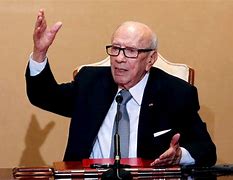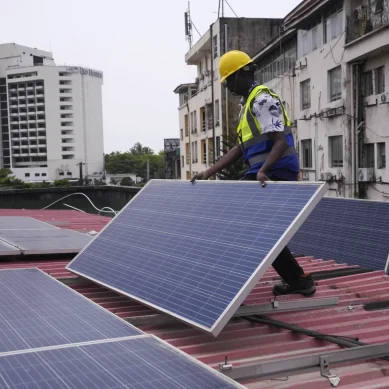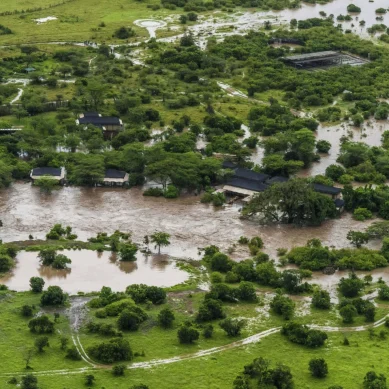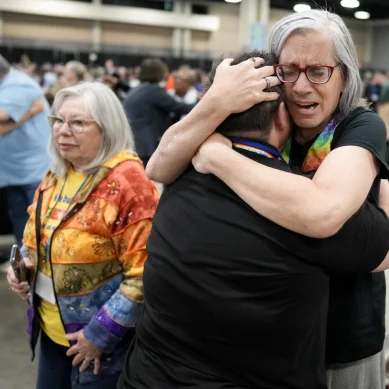
Six weeks after an incendiary speech by Tunisian President Kais Saied triggered a surge in racist violence against sub-Saharan migrants, hundreds of its victims are still camped on a cobblestone lane outside the headquarters of the UN’s migration agency, IOM, asking for emergency evacuation.
“Our lives are under threat,” said Josephus Thomas, a political refugee from Sierra Leone, standing among the makeshift tents and hastily packed bags lining the pavement in the capital, Tunis. “The situation is getting worse by the day.”
Thomas, 30, has few other options. The former building site labourer lost his job – with his boss even refusing to pay the wages he was owed – and his apartment was looted by a mob of young men looking for African migrants to beat up.
When The New Humanitarian first met him early last month, he was desperate, living rough with his wife and young child alongside 300 other people outside the IOM office, in miserable, unsanitary conditions.
Other migrants are sheltering in equally difficult circumstances outside the office of the UN’s refugee agency, UNHCR. For the past two weeks, there have been protests there by people demanding help in getting out of the country.
“The world needs to know we’re not safe in Tunisia,” said Thomas, who was at the demonstrations. “Europe doesn’t want us, but we need to leave. We’d like to go to any place in Africa where human rights are respected.”
The trigger for the xenophobic violence in Tunis and several other cities were comments made on February 21 by an increasingly authoritarian Saied when he ordered “urgent measures” to tackle irregular migration.
Tapping into the extremist rhetoric of the far-right Tunisian Nationalist Party, he described the presence of Black Africans as a “criminal plot” to alter the country’s demographic composition, turning it “solely African with no affiliation to the Arab or Islamic nations”.
Knife and club-wielding gangs took to the streets targeting anyone looking “African”. There were beatings, stabbings, and reported rapes. The police often either stood by, or in some cases arrested the victims.
Osman Sisi had a close escape trying to help other migrants being attacked in their homes in the Raoued suburb of the city. “When we fled our flat, I was covered in blood while carrying two kids [belonging to my neighbours] in my arms and one on my back,” he narrated.
He pulled up the sleeve of his jacket to show his bruises. “I feel pain everywhere,” Sisi said. He also lost the little cash he had saved to help his sick mother back in Sierra Leone.
In a climate fuelled in part by toxic social media posts, landlords have evicted migrants from their homes, with mobs then stealing their savings and destroying their belongings. Like Thomas, Black Africans have also been sacked by their employers or detained after ethnically profiling ID checks by the security forces.
Some have been forcibly held at the al-Ouardia migrant centre in Tunis. Others have experienced insults and racial slurs on the streets and avoid venturing out as much as possible. Those camped at the IOM headquarters stay within a narrow perimeter around the building, but groups of young men have still thrown stones and harassed them.
There are an estimated 21,000 African migrants in the country, out of a Tunisian population of 12 million. About 7,200 are students enrolled in universities and roughly 5,000 are registered refugees and asylum seekers.
The remainder are undocumented, arriving under a previously relaxed visa regime that allowed migrants into the country as cheap labour or as they saved to make the crossing to Europe, 400 kilometres across the Mediterranean. They now face extreme difficulty in securing the right paperwork to regularise their stay in Tunisia.
Last month, the governments of Côte d’Ivoire, Guinea, Mali and Senegal organised return flights for a few hundred of their citizens, including university students, but thousands more are stuck and looking to leave.
Tunisia had marketed itself on the continent as a cost-effective destination for further education. But Mahamadou Maiga, a Malian student who left Tunisia on March 4 after his apartment building was set on fire, said he was only too glad to get out. “We can’t study in that state of tension,” he told The New Humanitarian via WhatsApp.
“They were armed with sticks, knives and sharp objects, chasing fellow Africans in the neighbourhood.”
Thomas came to Tunisia in early 2021 and found work as a building labourer. His wife Latisha, 27, and their son Manuel, joined him last year. Latisha worked on a farm a few hours’ journey from Tunis.
When the violence began, mobs of Tunisian men were roaming the couple’s Ariana neighbourhood. “It was terrifying,” Thomas explained. “They were armed with sticks, knives, and sharp objects, chasing fellow Africans in the neighbourhood.”
It took five days before he heard from Latisha that she was safe and in hiding with their son.
- The New Humanitarian report











